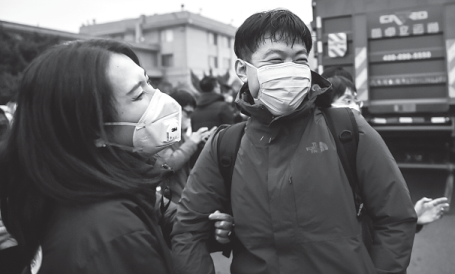Tale of two cities as couple fight epidemic


It has been more than 40 days since nurse Xing Zhengtao hugged his wife Bai Yu and their 18-month old daughter at their home in Beijing.
Xing is serving on the frontline, more than 1,000 kilometers from home, in the fight against the novel coronavirus outbreak in the hardest-hit area, Wuhan, Hubei province. In that city alone, the disease has claimed more than 2,400 lives and infected about 50,000 so far.
The 32-year-old nurse who works on emergency treatment at Xuanwu Hospital was among the first batch of 136 volunteer medics from Beijing on Jan 27 sent to tackle the epidemic in Wuhan.
There was not enough time to say goodbye to the rest of the family. Within 24 hours of receiving the notice, Xing's plane took off from the Beijing Capital International Airport, leaving his wife Bai heartbroken.
"Serve our country. I will be here for you," Bai, also a nurse in Xuanwu Hospital, said on WeChat that day.
The couple got married in 2018 and have a daughter.
To show his love to Bai, Xing had his name and Chinese characters meaning "Bai Yu, I love you" written on his protective suit on the first day he entered the ward at the Union Hospital affiliated to Tongji Medical College of Huazhong University of Science and Technology. Before that, he had received training on self-protection against the highly infectious disease while providing medical care.
Although prepared physically and psychologically, on Jan 31, the first day he entered the ward, Xing's heart registered 100 beats a minute.
Xuanwu Hospital sent 12 medical professionals to Wuhan after the COVID-19 outbreak, including eight nurses, according to Science and Technology Daily. Xing is one of three male nurses among them. He said that male nurses have some advantages over their female counterparts, such as greater physical strength.
Xing was touched by his patients.
"Some patients, even in masks, would turn their back to me while talking, afraid of me getting infected from them," Xing says.
Many describe the fight against the virus as "a war without smoke".
In Xing's eyes, "in war, there is sacrifice and death".
There is a shortage of protective suits and many doctors and nurses are reported to wear adult diapers as they work through long shifts.
Health authorities across China and the military had sent more than 40,000 medical workers in more than 330 groups to Hubei province to aid treatment efforts, official data shows.
According to the National Health Commission, a total of 1,716 of them have been diagnosed with the disease, with six deaths as of Feb 11.
In early February, Xing saw the first patient in his ward to fully recover and leave the hospital, which "gives him hope".
"It feels like that the dark is gone and suddenly the sun comes up," Xing says.
Every morning Bai leaves a text message reminding Xing of self protection on WeChat.
After helping carry heavy supplies for medical teams late at night, Xing is back in his room and connects for a video chat with his wife who asks "when is your next shift?" Their daily dialogue is simple, usually about their work that day, reminding each other to wash hands frequently and take preventive action.
Although not in the same city, their missions are the same-to fight against the novel coronavirus.
When working at the Union Hospital affiliated to Tongji Medical College of Huazhong University of Science and Technology, Xing is a careful nurse.
Once, an anxious patient in his 50s wanted to take off his mask due to discomfort. Xing tried every way to persuade him to continue to wear it.
Meanwhile his wife Bai is on duty at the emergency treatment department, also the frontline in combating the outbreak, where she is responsible for checking patients' temperature.
Arriving at the hospital earlier than usual and taking preventive action carefully, she answers every question that patients ask and takes care of those in need. While triaging patients, she also keeps a close eye on potential COVID-19 infected people.
Before entering the area between isolation and general wards, Xing in protective clothing tells the media: "To be honest, the work intensity in the ward is much higher than in the emergency treatment department, but I want to work there. I chose nursing as my profession because I have witnessed how helpless patients can be when people in my family got sick. Luckily, my wife is also a nurse. We can understand each other.
"Although in two cities, it feels like we are fighting shoulder-to-should. We will remember it forever," Xing says.
On Valentine's Day, Xing told Bai that when the epidemic is over, he will take her to Wuhan for cherry blossom and hot dry noodles.
On March 10, only 20 additional cases were counted nationwide, 17 of them in Hubei. The province's vice-governor Yang Yunyan at a news conference on March 3, said that the decreasing number of confirmed cases shows "the spread of the epidemic has preliminarily been curbed".
For Bai, her only wish is to have her husband back safely.
The day for family reunion will come in the near future, Xing says.




































